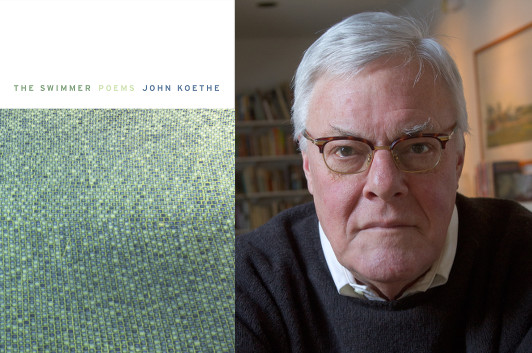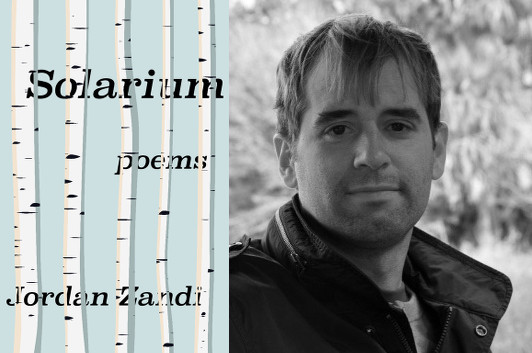John Koethe and the Poetic Sentence

photo: Tom Bamberger
The poems in John Koethe’s The Swimmer are like personal essays, a mixture of autobiographical anecdote and layered references to literature, art, science, and philosophy. And one of the first things you’ll notice about the cadence of those poems is its similarity to prose—but it’s not a “ordinary sentences peppered with random line breaks” kind of banal, descriptive poetry; these are complex, intricate sentences that, as Koethe explains in this essay, aim to mirror the processes of recollection and reflection that shape our memories, and the ways we come to see what we have experienced through what we have learned. There is no memory without interpretation, and as we re-interpret our pasts, we are also re-defining our present.
I started writing poetry in 1964 as a sophomore in college, after a course on modern literature in which I first read the poets of high modernism. I wasn’t sure exactly what they were doing, but I was bowled over by it and knew I wanted to try to do it too. Learning to write poetry is at first a process of imitation—especially back then, before the proliferation of programs in “creative writing” (how I hate that term!)—and while my first models were Eliot (whom I still revere) and Pound (whom I don’t care for anymore, apart from his Chinese (non)translations), that circle soon expanded to include Wordsworth and Keats, John Ashbery and James Schuyler, Wallace Stevens, Marianne Moore and Elizabeth Bishop, and later on Philip Larkin; as well as fiction writers like Proust, Fitzgerald, Thomas Pynchon and even Raymond Chandler.
What these writers have in common is that they’re all great writers of sentences, and sentences are at the heart of what I’m after in poetry, perhaps to a greater extent than they are for many other poets. What I try to do is capture the feeling and movements of thought, and not only are sentences the vehicles of thought, their clauses and connectives allow them to convey the rhythmic and emotional cadences that are an integral part of the experience of thought.
With any luck you eventually digest your early influences, for better or worse, and it’s been many years since I’ve been aware of a feeling of being guided in my writing by the work of other writers. Yet those first influences remain important to me as an ideal, or an idea, of how to think of poetry. I think of modernism as a continuation of, rather than a break with, romanticism, in that both are concerned to situate the inner self in relation to its objective social and physical setting in the world. In its high romantic incarnation, this concern takes the revelatory form of what Kant called the experience of the sublime; in its disillusioned modern incarnation it verges on the tragic.
20 March 2016 | poets on poets |
Jordan Zandi: Borrowing Szymborksa

photo courtesy Jordan Zandi
Jordan Zandi is the winner of the 2014 Kathryn A. Morton Prize in Poetry, on the strength of his debut collection, Solarium. When you read a poem like “Chamber Music,” or the one that gives the collection its title, you’re in the presence of a poet who’s able to nimbly position himself within the natural world, but who’s also well aware of the theatricality of that positioning—and able to convey it to you without being overly arch about it, so that the voice seems as natural as the setting. In this guest essay, he talks about a poet whose work helps him get to that place.
My experience with process when it comes to poetry is that it works in cycles; and during the winter phase I write as badly as I ever have, as if I’ve learned nothing since first starting. My imagination becomes an old wooden hunk that I hack into forced chunks of language until a poem clatters onto the floor. The end.
Or so it feels. I once brought a longish one of these poems, roughly three pages, to my most trusted reader. She put a star beside one line and then told me that the rest was dead; throw it out. “Borrow this,” she said, “it’ll help you generate material,” and she handed me a collection by Wisława Szymborksa.
Like Wallace Stevens’, Szymborksa’s poems offer transport to a world. There are strange landscapes, vignettes, charming anecdotes, parables and fabulae, and scenarios arising out of untamed logics. When I’m writing badly, such transport is what I need. Look, for example, at this hilariousness in “In Heraclitus’s River:”
In Heraclitus’s river
a fish is busy fishing
a fish guts a fish with a sharp fish
a fish builds a fish, a fish lives in a fish,
a fish escapes from a fish under siege.So much work gets enmired in predictability: You read the first few lines and you can ballpark the rest; or you write a few lines and you realize you’re going straight where you’ve gone before. But you cannot guess where most of her poems will go, even in this one, where the root of the logic is so forthrightly acknowledged.
27 February 2016 | poets on poets |

 Our Endless and Proper Work is my new book with Belt Publishing about starting (and sticking to) a productive writing practice.
Our Endless and Proper Work is my new book with Belt Publishing about starting (and sticking to) a productive writing practice. 
